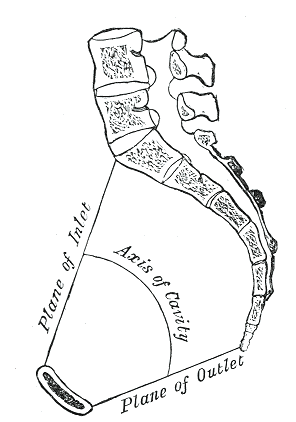Suspensory ligament of ovary
(Redirected from Suspensory ligament of the ovary)
The suspensory ligament of ovary (also known as the infundibulopelvic ligament) is a fold of peritoneum that extends out from the ovary to the wall of the pelvis. It is an important structure in the female reproductive system.
Anatomy[edit | edit source]
The suspensory ligament of the ovary is a part of the broad ligament of the uterus. It contains the ovarian artery, ovarian vein, ovarian nerve plexus, and lymphatic vessels. These structures are crucial for the blood supply, innervation, and lymphatic drainage of the ovary.
Function[edit | edit source]
The primary function of the suspensory ligament of the ovary is to support the ovary and maintain its position within the pelvic cavity. It also serves as a conduit for the blood vessels, nerves, and lymphatics that supply the ovary.
Clinical Significance[edit | edit source]
The suspensory ligament of the ovary is often involved in surgical procedures such as oophorectomy (removal of the ovary) and salpingo-oophorectomy (removal of the ovary and fallopian tube). During these procedures, the ligament is typically ligated to prevent bleeding from the ovarian vessels.
Related Structures[edit | edit source]
- Ovary
- Broad ligament of the uterus
- Ovarian artery
- Ovarian vein
- Lymphatic system
- Female reproductive system
See Also[edit | edit source]
References[edit | edit source]
External Links[edit | edit source]
Search WikiMD
Ad.Tired of being Overweight? Try W8MD's NYC physician weight loss.
Semaglutide (Ozempic / Wegovy and Tirzepatide (Mounjaro / Zepbound) available. Call 718 946 5500.
Advertise on WikiMD
|
WikiMD's Wellness Encyclopedia |
| Let Food Be Thy Medicine Medicine Thy Food - Hippocrates |
Translate this page: - East Asian
中文,
日本,
한국어,
South Asian
हिन्दी,
தமிழ்,
తెలుగు,
Urdu,
ಕನ್ನಡ,
Southeast Asian
Indonesian,
Vietnamese,
Thai,
မြန်မာဘာသာ,
বাংলা
European
español,
Deutsch,
français,
Greek,
português do Brasil,
polski,
română,
русский,
Nederlands,
norsk,
svenska,
suomi,
Italian
Middle Eastern & African
عربى,
Turkish,
Persian,
Hebrew,
Afrikaans,
isiZulu,
Kiswahili,
Other
Bulgarian,
Hungarian,
Czech,
Swedish,
മലയാളം,
मराठी,
ਪੰਜਾਬੀ,
ગુજરાતી,
Portuguese,
Ukrainian
Medical Disclaimer: WikiMD is not a substitute for professional medical advice. The information on WikiMD is provided as an information resource only, may be incorrect, outdated or misleading, and is not to be used or relied on for any diagnostic or treatment purposes. Please consult your health care provider before making any healthcare decisions or for guidance about a specific medical condition. WikiMD expressly disclaims responsibility, and shall have no liability, for any damages, loss, injury, or liability whatsoever suffered as a result of your reliance on the information contained in this site. By visiting this site you agree to the foregoing terms and conditions, which may from time to time be changed or supplemented by WikiMD. If you do not agree to the foregoing terms and conditions, you should not enter or use this site. See full disclaimer.
Credits:Most images are courtesy of Wikimedia commons, and templates, categories Wikipedia, licensed under CC BY SA or similar.
Contributors: Prab R. Tumpati, MD


